Zetta Elliott's Blog, page 28
October 2, 2017
learning to listen
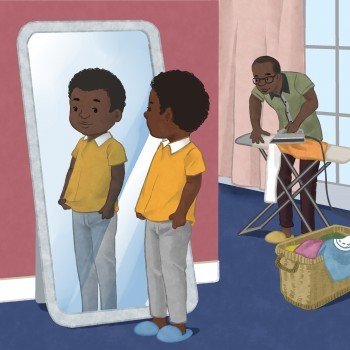 Roll-outs can be bumpy and before Benny even went to print, I knew I had a problem. At the back of the book I included a list of websites; some were recommended by friends, and others I found on the websites that come from the Black ASD community (The Color of Autism). I included Autism Speaks on my list and an author friend, Cory Silverberg, let me know that it was a problematic organization. It has been criticized for speaking for but excluding people with autism; there are also issues with their allocation of funds, leadership, and mission to find a “cure” for autism. I found a good summary of the problems here. When Cory told me about Autism Speaks, I reached out to a graphic designer friend to see if I could have it removed; she needed the original file, which I couldn’t get. So I went to print with the files I had, accepting that I would have to apologize for having Autism Speaks on my list. I’m still trying to get the original file fixed and will try to add the Autistic Self-Advocacy Network. I’m sorry for the hurt my inclusion of Autism Speaks may cause, and thank Cory and author/librarian Ann Clare LeZotte for alerting me to the problem. Ann also pointed out that “special needs” isn’t an acceptable term—we should talk about kids with disabilities, not “special needs.” I didn’t know that, and hope my education can help others learn as well.
Roll-outs can be bumpy and before Benny even went to print, I knew I had a problem. At the back of the book I included a list of websites; some were recommended by friends, and others I found on the websites that come from the Black ASD community (The Color of Autism). I included Autism Speaks on my list and an author friend, Cory Silverberg, let me know that it was a problematic organization. It has been criticized for speaking for but excluding people with autism; there are also issues with their allocation of funds, leadership, and mission to find a “cure” for autism. I found a good summary of the problems here. When Cory told me about Autism Speaks, I reached out to a graphic designer friend to see if I could have it removed; she needed the original file, which I couldn’t get. So I went to print with the files I had, accepting that I would have to apologize for having Autism Speaks on my list. I’m still trying to get the original file fixed and will try to add the Autistic Self-Advocacy Network. I’m sorry for the hurt my inclusion of Autism Speaks may cause, and thank Cory and author/librarian Ann Clare LeZotte for alerting me to the problem. Ann also pointed out that “special needs” isn’t an acceptable term—we should talk about kids with disabilities, not “special needs.” I didn’t know that, and hope my education can help others learn as well.
September 29, 2017
meet Benny!
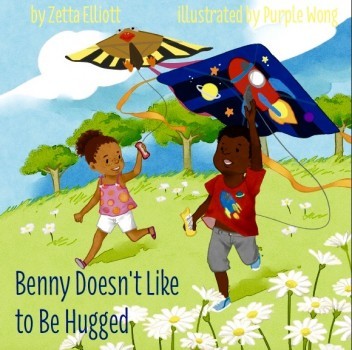 Are you on my mailing list? If not, you can view my latest newsletter here. I released a new picture book today, Benny Doesn’t Like to Be Hugged, and hope it finds a welcome home in the world. There were some design glitches along the way and I know it’s hard to read the yellow text at the top of the front cover, but I decided to go ahead with publication instead of starting over. My usual designer had a death in the family and my stand-in was a bit of a nightmare. I couldn’t afford to hire another designer to do everything over, so I let go…I’m getting better at doing that! I often say that I wouldn’t have almost 30 books for young readers if I was precious about each one. I don’t demand perfection from my books, even though I know they will be scrutinized and judged more
Are you on my mailing list? If not, you can view my latest newsletter here. I released a new picture book today, Benny Doesn’t Like to Be Hugged, and hope it finds a welcome home in the world. There were some design glitches along the way and I know it’s hard to read the yellow text at the top of the front cover, but I decided to go ahead with publication instead of starting over. My usual designer had a death in the family and my stand-in was a bit of a nightmare. I couldn’t afford to hire another designer to do everything over, so I let go…I’m getting better at doing that! I often say that I wouldn’t have almost 30 books for young readers if I was precious about each one. I don’t demand perfection from my books, even though I know they will be scrutinized and judged more 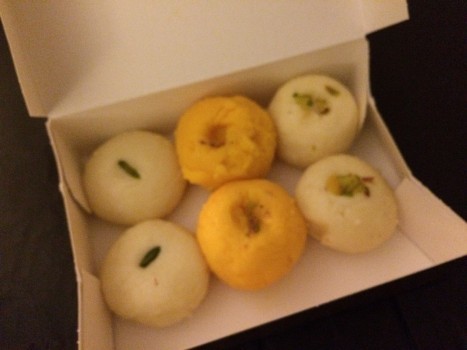 harshly because they’re self-published. I’ve got another book in production and my second novel for Random House is due tomorrow; I’ve got lots of ideas but very little written down, and appreciated the two-week extension from my editor. Yesterday a friend took me to a sweets shop in Queens so I could try peda, the delicious Gujarati dessert I wrote about last summer. So even though I’m not writing, I’m still “in the zone.” And now Benny is out in the world, so that clears a bit of room on my plate. The newsletter is heading to inboxes and hopefully the hard copies will arrive before I leave for San Francisco next Thursday. My niece pointed out that I already have a character named Benny in A Wave Came through Our Window; she’s right, and I did think about changing this child’s name, but I’d been saying the title over and over in my head for so long…I just went with it. If you’d like a review copy of the new picture book, just let me know. And if you know Black children with autism, please tell them about Benny.
harshly because they’re self-published. I’ve got another book in production and my second novel for Random House is due tomorrow; I’ve got lots of ideas but very little written down, and appreciated the two-week extension from my editor. Yesterday a friend took me to a sweets shop in Queens so I could try peda, the delicious Gujarati dessert I wrote about last summer. So even though I’m not writing, I’m still “in the zone.” And now Benny is out in the world, so that clears a bit of room on my plate. The newsletter is heading to inboxes and hopefully the hard copies will arrive before I leave for San Francisco next Thursday. My niece pointed out that I already have a character named Benny in A Wave Came through Our Window; she’s right, and I did think about changing this child’s name, but I’d been saying the title over and over in my head for so long…I just went with it. If you’d like a review copy of the new picture book, just let me know. And if you know Black children with autism, please tell them about Benny.
September 21, 2017
Imagining Alternatives
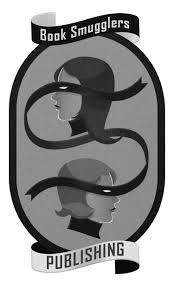 The Book Smugglers need your support! I wrote this essay for their Kickstarter campaign and hope you’ll go over to their page and pledge however much you can. I know there are a lot of worthy causes that deserve help right now. It’s also important that we envision a world where humans don’t create and/or suffer from catastrophes—and that’s what The Book Smugglers do…
The Book Smugglers need your support! I wrote this essay for their Kickstarter campaign and hope you’ll go over to their page and pledge however much you can. I know there are a lot of worthy causes that deserve help right now. It’s also important that we envision a world where humans don’t create and/or suffer from catastrophes—and that’s what The Book Smugglers do…
I don’t often think of my imagination having limits. I’ve published twenty-six books for young readers, and just wrote a middle grade novel in under three weeks. When I do school visits, I tell kids that writing, for me, is 70% dreaming. I even quit my day job three years ago so I would have more time to write. But when I first heard Angela Davis talk about prison abolition, my brain balked. I knew how mass incarceration had devastated communities of color, and I had taught my college students about the school-to-prison pipeline. Yet I found myself unwilling to imagine alternatives to the current prison system in the US. Why?
Even when institutions fail us, it’s hard for most of us to immediately divest. We welcome efforts to reform problematic practices, but total transformation can seem a step too far. Unfortunately, superficial changes rarely solve issues that are institutional; hiring a few more officers of color seems like a good idea, but it won’t end police brutality because the problem is cultural and systemic. The same holds true for the publishing industry. As a Black feminist writer who often has no choice but to self-publish, I’m frequently frustrated by the many barriers placed in the path of indie authors. Data published annually by the Cooperative Children’s Book Center prove that the US publishing industry has been systematically excluding IPOC for decades—largely because the industry is dominated by straight, White, cisgender women who don’t have disabilities. Yet when a marginalized writer dares to self-publish, most review outlets, blogs, bookstores, and libraries refuse to give the book a chance. But not The Book Smugglers.
I can’t name all the editors, reviewers, librarians, and booksellers who have rejected my work over the past decade. But I can count on one hand the progressive people in the kid lit community who have embraced my books. Ana and Thea were among the first to treat my writing with respect instead of contempt. Not only did they review my novels, they gave me the opportunity to write guest posts for their blog. Other YA blogs have rejected my posts as “too political,” but that has never been an issue at The Book Smugglers. Ana and Thea welcome provocative ideas and use their platforms as a space for genuine diversity—different kinds of people with different ideas creating books in different ways.
When the publishing industry failed to produce inclusive speculative fiction, these radical women started soliciting, acquiring, editing, and publishing fiction themselves. Editors at corporate publishers claim they just can’t find talented IPOC writers, and yet Thea and Ana have attracted an incredibly talented pool of emerging and established writers from diverse backgrounds. They didn’t just talk about or wish for diversity; they took direct action and published unapologetically unconventional short fiction, novellas, and essays that might never find a home within the traditional publishing industry.
As a self-publisher, I know how much time, energy, and money it takes to produce good work. I immediately donated to The Book Smugglers’ Kickstarter campaign—and encourage you to do the same—because what these incredible women are doing is part of a radical feminist DIY tradition.
When I finally decided to self-publish much of my work, I drew inspiration from Black feminists like Audre Lorde and Barbara Smith who helped to found Kitchen Table: Women of Color Press three decades ago. Lorde told Smith, “We really need to do something about publishing.” The Book Smugglers honor Lorde’s words and help us all to envision a publishing arena (and a world!) that is more expansive, more inclusive, and welcoming to all.
September 20, 2017
Black Books Matter
 I’ll be heading back to Britain in October and have a very busy birthday week lined up. On the 24th I’ll be giving a talk in the Faculty of Education at Cambridge University, then I’ll head up to Newcastle the following day to deliver the same talk at Seven Stories, the National Centre for Children’s Literature. You can learn more about those events here. On my actual birthday (October 26) I’ll be attending a symposium, What’s Happening in Black British History, before presenting that afternoon at the University of London’s School of Advanced Study. I met Susan Belgrave last spring at Coventry Law School and she suggested we collaborate on another event for youth when I returned. “Black Books Matter” will be an interactive workshop and I hope teens do come out (October is Black History Month in the UK). I hope to see some friends as well while I’m over there but mostly I’m looking forward to disappearing for a while. Being in Nova Scotia this past weekend was wonderful—I didn’t take my laptop but came home with a head full of ideas. Now I just have to sit down and WRITE…
I’ll be heading back to Britain in October and have a very busy birthday week lined up. On the 24th I’ll be giving a talk in the Faculty of Education at Cambridge University, then I’ll head up to Newcastle the following day to deliver the same talk at Seven Stories, the National Centre for Children’s Literature. You can learn more about those events here. On my actual birthday (October 26) I’ll be attending a symposium, What’s Happening in Black British History, before presenting that afternoon at the University of London’s School of Advanced Study. I met Susan Belgrave last spring at Coventry Law School and she suggested we collaborate on another event for youth when I returned. “Black Books Matter” will be an interactive workshop and I hope teens do come out (October is Black History Month in the UK). I hope to see some friends as well while I’m over there but mostly I’m looking forward to disappearing for a while. Being in Nova Scotia this past weekend was wonderful—I didn’t take my laptop but came home with a head full of ideas. Now I just have to sit down and WRITE…
September 2, 2017
back to work
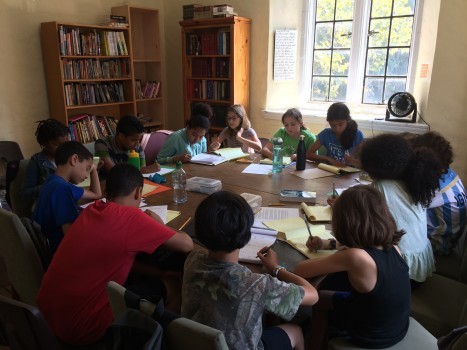 I’ve worked with kids for almost 30 years, but my summer class at Uptown Stories was the first time I had a group of diverse, dedicated writers. I could give them a prompt and off they’d go—no talking, no stalling, just pens scribbling furiously. It was amazing! But because I’m a creature of habit, even teaching just four hours a day threw my entire writing routine out of whack. I didn’t run in the park, and I ate way too much takeout because I was too tired to cook when I got home. I went from averaging over a thousand words a day last week to writing absolutely nothing—on the novel, that is. Each night I developed lesson plans and writing prompts, and this morning I got up early to type up the last of the students submissions (their work will be published in
I’ve worked with kids for almost 30 years, but my summer class at Uptown Stories was the first time I had a group of diverse, dedicated writers. I could give them a prompt and off they’d go—no talking, no stalling, just pens scribbling furiously. It was amazing! But because I’m a creature of habit, even teaching just four hours a day threw my entire writing routine out of whack. I didn’t run in the park, and I ate way too much takeout because I was too tired to cook when I got home. I went from averaging over a thousand words a day last week to writing absolutely nothing—on the novel, that is. Each night I developed lesson plans and writing prompts, and this morning I got up early to type up the last of the students submissions (their work will be published in 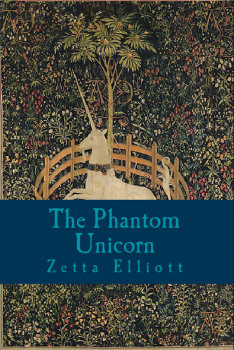 an anthology). But I didn’t add a word to The Phantom Unicorn. I did, however, print out three sample chapters and my outline to share with the kids. Before and after our trip to The Cloisters on Wednesday, we read the novel together and the kids seemed really into it. Then on the last day, we went down to Books of Wonder and held a reading; afterwards several parents came up to tell me that their child couldn’t stop talking about The Phantom Unicorn. So…I think it really works for the middle grade crowd. One of my older writers (a rather cynical eleven-year-old) even said she would read the book not because she knew the author, but because it was as good as any book she’d find in her school library. High praise! I’m thrilled that Charity Russell will be doing the cover art and if my agent passes on the story, I’ll self-publish it and have Charity do black and white illustrations for the interior as well. If I can get back to writing a thousand words a day, I should be able to finish it over this long weekend. Then I need to switch gears and get to work on The Dragon Thief. Purple is making excellent progress on Benny Doesn’t Like to Be Hugged—just four more illustrations to go!—and I finally found a couple of Senegalese sensitivity readers for The Return. So I may self-publish three books this fall…and it feels like fall outside today. I’m ready for autumn. I’m ready to go into hibernation mode and read and write and dream all day…
an anthology). But I didn’t add a word to The Phantom Unicorn. I did, however, print out three sample chapters and my outline to share with the kids. Before and after our trip to The Cloisters on Wednesday, we read the novel together and the kids seemed really into it. Then on the last day, we went down to Books of Wonder and held a reading; afterwards several parents came up to tell me that their child couldn’t stop talking about The Phantom Unicorn. So…I think it really works for the middle grade crowd. One of my older writers (a rather cynical eleven-year-old) even said she would read the book not because she knew the author, but because it was as good as any book she’d find in her school library. High praise! I’m thrilled that Charity Russell will be doing the cover art and if my agent passes on the story, I’ll self-publish it and have Charity do black and white illustrations for the interior as well. If I can get back to writing a thousand words a day, I should be able to finish it over this long weekend. Then I need to switch gears and get to work on The Dragon Thief. Purple is making excellent progress on Benny Doesn’t Like to Be Hugged—just four more illustrations to go!—and I finally found a couple of Senegalese sensitivity readers for The Return. So I may self-publish three books this fall…and it feels like fall outside today. I’m ready for autumn. I’m ready to go into hibernation mode and read and write and dream all day…
August 18, 2017
what you find in your mind
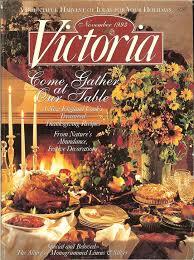 I used to read magazines. Friends even gifted me subscriptions, knowing I’d never bother (or couldn’t afford to) subscribe myself. In high school, I read ELLE. When I was in college, I loved Victoria magazine. I used to spend hours going through the glossy pages, clipping photos of empty English gardens surrounding quaint thatched cottages and tables set with expensive china, fine linen, and fancy crystal. The gardens and houses were almost always empty (except for the occasional, wistful, red-headed White woman), and it was the absence of people that made the scenes so appealing. How else could you achieve perfect order—total stillness and silence? I’m not sure I understood that the magazine was name after Queen Victoria, but I knew that my obsession with Victoriana wasn’t something I could share with everyone. After college I got a subscription to Ms. magazine and loved not just the radical feminist content but the absence of advertisements. I read Oprah’s magazine for a while but it was a bit too glossy, too much like the ad-filled fashion magazines I admired as a teen. But there were inspirational inserts in O magazine that you could tear out and keep in your wallet, and for years I had one little square pinned to my bulletin board: “What you find in your mind is what you put there. Put good things in there.”
I used to read magazines. Friends even gifted me subscriptions, knowing I’d never bother (or couldn’t afford to) subscribe myself. In high school, I read ELLE. When I was in college, I loved Victoria magazine. I used to spend hours going through the glossy pages, clipping photos of empty English gardens surrounding quaint thatched cottages and tables set with expensive china, fine linen, and fancy crystal. The gardens and houses were almost always empty (except for the occasional, wistful, red-headed White woman), and it was the absence of people that made the scenes so appealing. How else could you achieve perfect order—total stillness and silence? I’m not sure I understood that the magazine was name after Queen Victoria, but I knew that my obsession with Victoriana wasn’t something I could share with everyone. After college I got a subscription to Ms. magazine and loved not just the radical feminist content but the absence of advertisements. I read Oprah’s magazine for a while but it was a bit too glossy, too much like the ad-filled fashion magazines I admired as a teen. But there were inspirational inserts in O magazine that you could tear out and keep in your wallet, and for years I had one little square pinned to my bulletin board: “What you find in your mind is what you put there. Put good things in there.”
 Lately I’ve been trying to cut back on my news consumption because the news just seems to get worse and worse. I usually listen to NPR for 3-4 hours each morning and then I watch 2.5 hours of news coverage on TV each evening. But endless analysis of neo-Nazis isn’t helping right now, so I’ve been tuning out and binge-watching Escape to the Country. I’m on my 23rd episode and find it really soothing to look at empty, perfectly staged country cottages surrounding by rolling hills occupied only by sheep. I’ve still got one foot in the real world: I’m working on three books at once, finalizing plans for 2018 author talks, and trying to set an itinerary for my birthday trip to the UK in October. And yesterday I woke up with the title for my next novel: The Phantom Unicorn! I dug out a book about the Met’s unicorn tapestries that was given to me by a former student and even thought about going up to the Cloisters today. It’s rainy and gloomy this morning, which is perfect weather for researching a ghost story but I think I’ll stay in and hammer out my plot. I’ve decided the protagonist is a mixed-race (Black/Asian) boy with two moms who feels out of place in his new neighborhood but is eagerly awaiting the arrival of his beloved godfather. But there’s an unexpected change of plans when his godfather gets arrested at a protest. I can hear snippets of conversation between the boy and his new friend Otto: “What did he do—punch a Nazi?” I’ve decided to do what I want with this story because it’s primarily for my upcoming class at Uptown Stories, though I may end up self-publishing it as a City Kids book. I’m still learning about Washington Heights and will be taking my students to the Cloisters on Day 3. We only have 5 days together so I need to show up on the first day with a draft of my own ghost story and proven techniques for writing historical fantasy. I usually ask kids to consider having a magical object in their story and mine is the “looking drop” gifted to me by a friend. It’s round with mirrors on both sides, but what if it became a lens that let you look back in time?
Lately I’ve been trying to cut back on my news consumption because the news just seems to get worse and worse. I usually listen to NPR for 3-4 hours each morning and then I watch 2.5 hours of news coverage on TV each evening. But endless analysis of neo-Nazis isn’t helping right now, so I’ve been tuning out and binge-watching Escape to the Country. I’m on my 23rd episode and find it really soothing to look at empty, perfectly staged country cottages surrounding by rolling hills occupied only by sheep. I’ve still got one foot in the real world: I’m working on three books at once, finalizing plans for 2018 author talks, and trying to set an itinerary for my birthday trip to the UK in October. And yesterday I woke up with the title for my next novel: The Phantom Unicorn! I dug out a book about the Met’s unicorn tapestries that was given to me by a former student and even thought about going up to the Cloisters today. It’s rainy and gloomy this morning, which is perfect weather for researching a ghost story but I think I’ll stay in and hammer out my plot. I’ve decided the protagonist is a mixed-race (Black/Asian) boy with two moms who feels out of place in his new neighborhood but is eagerly awaiting the arrival of his beloved godfather. But there’s an unexpected change of plans when his godfather gets arrested at a protest. I can hear snippets of conversation between the boy and his new friend Otto: “What did he do—punch a Nazi?” I’ve decided to do what I want with this story because it’s primarily for my upcoming class at Uptown Stories, though I may end up self-publishing it as a City Kids book. I’m still learning about Washington Heights and will be taking my students to the Cloisters on Day 3. We only have 5 days together so I need to show up on the first day with a draft of my own ghost story and proven techniques for writing historical fantasy. I usually ask kids to consider having a magical object in their story and mine is the “looking drop” gifted to me by a friend. It’s round with mirrors on both sides, but what if it became a lens that let you look back in time?
I won’t lie—I’m thinking seriously about how to spend an extended amount of time OUTSIDE of the US right now. I feel myself withdrawing but I’m not ready to lay down my sword and shield. This is how I fight—I write. I hope you’re taking good care of yourself and being careful about what you put in your mind.
August 14, 2017
“those aren’t your people”
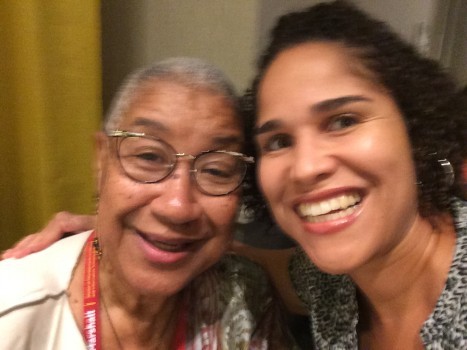 My first National Conference of African American Librarians (NCAAL) was a mixed bag. Earlier this month when I was at IRSCL in Toronto, I posted on Facebook that the way to survive an academic conference is to “find your people.” And when I arrived at the Buckhead station in Atlanta, I was immediately approached by a Black woman author who introduced herself and accompanied me to the hotel. We talked about self-publishing and what an organization like BCALA could do to support aspiring authors. I went up to my room, ordered some food, and then pulled my suitcase full of books back downstairs to the conference area on the lower level. The first person I saw was Satia Orange and my heart soared—Satia is one of the most gracious, kind, and generous people I’ve ever met and she organized the first NCAAL 25 years ago! We took a selfie, she offered to get me into the reception that evening, and then I caught the end of a panel with Greg Christie, Carole Boston Weatherford, and her collaborator son Jeffrey. There were only a few people in the room but a few more trickled in before our panel began. I read part of Milo’s Museum and showed my accompanying video, and Renee and Tonya both read from their latest
My first National Conference of African American Librarians (NCAAL) was a mixed bag. Earlier this month when I was at IRSCL in Toronto, I posted on Facebook that the way to survive an academic conference is to “find your people.” And when I arrived at the Buckhead station in Atlanta, I was immediately approached by a Black woman author who introduced herself and accompanied me to the hotel. We talked about self-publishing and what an organization like BCALA could do to support aspiring authors. I went up to my room, ordered some food, and then pulled my suitcase full of books back downstairs to the conference area on the lower level. The first person I saw was Satia Orange and my heart soared—Satia is one of the most gracious, kind, and generous people I’ve ever met and she organized the first NCAAL 25 years ago! We took a selfie, she offered to get me into the reception that evening, and then I caught the end of a panel with Greg Christie, Carole Boston Weatherford, and her collaborator son Jeffrey. There were only a few people in the room but a few more trickled in before our panel began. I read part of Milo’s Museum and showed my accompanying video, and Renee and Tonya both read from their latest 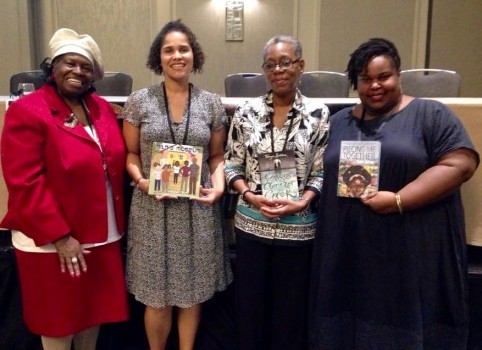 novels. There wasn’t much interest in my books—the self-published ones I was selling and the traditional ones carried by the designated bookseller. When I packed up and got back to my room, I saw a small jump in online sales so maybe people who attended our panel went to Amazon instead. Or maybe those sales weren’t related to NCAAL at all. But I found myself feeling a way that evening and texted a friend who responded by reminding me that conservative Southern “church ladies” are not “my people.” I was raised by “women of the church,” but I generally use the term “church ladies” to refer to older Black women whose radical impulses have been dulled by respectability politics; they are concerned primarily with image, don’t want to rock the boat, and have disdain for anyone who does. I’m not a librarian but as an author I’ve certainly worked with lots of librarians over the past decade and know that some of them are truly radical. And I know it’s not fair to characterize an entire organization as passive, but I’ve had this same conversation around the Coretta Scott King awards. Why are the same authors, illustrators, and genres celebrated year after year? It’s important to celebrate talented creators, but it’s hard to call someone “the best” when so few creators are given the opportunity to compete.
novels. There wasn’t much interest in my books—the self-published ones I was selling and the traditional ones carried by the designated bookseller. When I packed up and got back to my room, I saw a small jump in online sales so maybe people who attended our panel went to Amazon instead. Or maybe those sales weren’t related to NCAAL at all. But I found myself feeling a way that evening and texted a friend who responded by reminding me that conservative Southern “church ladies” are not “my people.” I was raised by “women of the church,” but I generally use the term “church ladies” to refer to older Black women whose radical impulses have been dulled by respectability politics; they are concerned primarily with image, don’t want to rock the boat, and have disdain for anyone who does. I’m not a librarian but as an author I’ve certainly worked with lots of librarians over the past decade and know that some of them are truly radical. And I know it’s not fair to characterize an entire organization as passive, but I’ve had this same conversation around the Coretta Scott King awards. Why are the same authors, illustrators, and genres celebrated year after year? It’s important to celebrate talented creators, but it’s hard to call someone “the best” when so few creators are given the opportunity to compete.
On Friday night I couldn’t sleep and started thinking about Angela Davis’ movement for prison abolition. I wound up starting my talk on Saturday by referencing the strange contradiction of Black people defending the prison system. Considering the devastating impact of mass incarceration on our communities, why wouldn’t we wholeheartedly support the dismantling of the prison system? Why are so many oppressed people so quick to defend systems that contribute to their oppression? As far as I’m concerned, the same applies to children’s literature. What would happen if BCALA issued a statement decrying anti-Black racism in the children’s publishing industry? Not much, perhaps, but don’t they have an obligation to speak up on behalf of the patrons they serve? Edi Campbell named our panel “Vanguards of Stories for Our Children,” and I took that to mean stepping up as a leader—and sticking your neck out, if need be. I regularly critique the publishing industry but other members of the kid lit community have to take responsibility for demanding and/or creating change. I shared this graphic from Reflection Press during my talk:
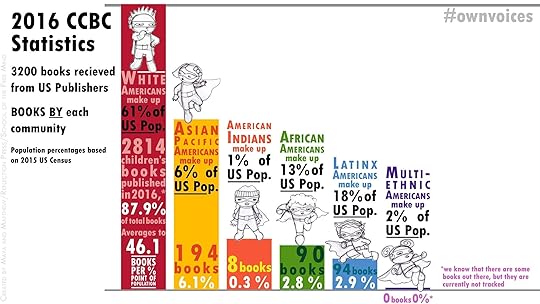 I understand the impulse to celebrate successful Black authors and illustrators—especially when the odds are stacked against them—but that shouldn’t preclude the demand for greater inclusion and broader representation. When you KNOW that less than 3% of books are being produced by Black creators and you CHOOSE to say nothing about that injustice, you’re implying consent. After our vanguards panel ended, the audience stayed for quite a while to discuss strategies for refocusing BCALA. I figured I’d take a moment here to share my specific recommendations as an outsider to the library profession:
I understand the impulse to celebrate successful Black authors and illustrators—especially when the odds are stacked against them—but that shouldn’t preclude the demand for greater inclusion and broader representation. When you KNOW that less than 3% of books are being produced by Black creators and you CHOOSE to say nothing about that injustice, you’re implying consent. After our vanguards panel ended, the audience stayed for quite a while to discuss strategies for refocusing BCALA. I figured I’d take a moment here to share my specific recommendations as an outsider to the library profession:
Issue a statement to acknowledge and condemn anti-Black racism and the exclusion of Black creators from the children’s literature community. This could include the need for more Black editors, reviewers, marketers, educators, booksellers, and librarians.
Embrace diverse methods of producing books, including self-publishing. Instead of excluding indie authors from libraries and/or expressing disdain for their books, offer support to improve the editing, design, and marketing of self-published books. Recognize that many self-published authors are people of color who have been systematically shut out of the traditional publishing industry. Our communities are full of storytellers and everyone deserves an opportunity to share their story.
Establish a new review column/website for Black kid lit. Train BCALA members in writing reviews and cover a wide range of media—especially books from small presses and indie authors since they are often excluded by the major review outlets.
Address the issue of corporate publisher influence in the library world. If “big money” is a problem in politics, then similar lobbying, wining & dining, and gift-giving should be considered a problem in the library profession, too. Corporate publishers spend inordinate amounts of money to promote just a handful of authors but the “big fish/small pond” syndrome (or “one and done” approach) doesn’t serve our communities; we need a range of authors with multiple perspectives. Demand that this money be redistributed and redirected into discovering and promoting more Black authors and illustrators (and/or reparations ). Small presses and indie authors are also unable to compete with the unreasonable expectations established by corporate publishers (free books, trips, meals, swag, etc).
Refute the idea that a book’s primary value is commercial. Our communities would benefit greatly from a non-profit press. Provide tools and resources so that library systems can partner with local organizations and individuals to practice community-based publishing (putting people ahead of profit). Too many of our stories go untold because traditional publishers see no economic value in them (and they only market books to White readers).
Ensure that the organization is a safe, welcoming space for EVERYONE. Take specific steps to engage LGBTQ readers (especially kids & teens), creators, and library professionals.
It’s a lot to ask, I know. And it isn’t easy being a Black librarian. But if justice is our goal, we’ve got to start doing things differently and I’m willing to do my part to support Black librarians who reject rather than uphold the status quo. Panelists and attendees agreed to keep the conversation going. If you have any suggestions, leave a comment!
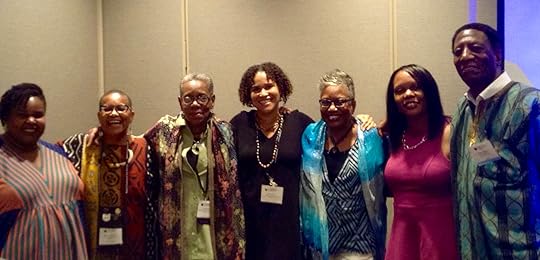
(l-r: Renee Watson, moderator Karen Lemmons, Tonya Bolden, me, Cheryl Willis Hudson, Kelly Starling Lyons, Wade Hudson)
August 7, 2017
trial & error
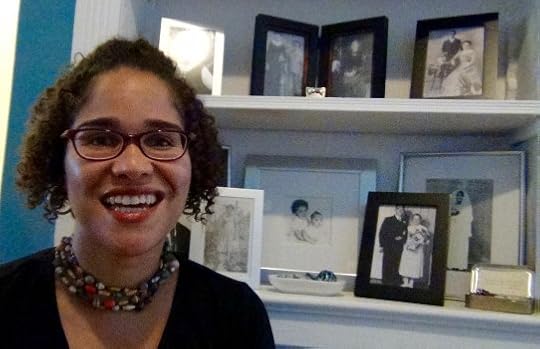 I’m smiling here—my video camera automatically takes photos while it’s filming—but I was NOT happy after taping this interview for the THIRD TIME yesterday. I don’t know why I have so much trouble with videos. My books generally come out the way I envisioned them but when I try to make an accompanying video, I always fall short. I took a class last month to learn how to make a movie on my phone and knew I wanted to talk about MILO’S MUSEUM. Ever since it was selected by Everybody Wins! DC for their book-of-the-week, sales have been higher than normal and I thought it was a good time to talk about my inspiration. I wrote a script, made a shot list, and knew which still photographs I wanted to add to my film. But Adobe Premiere only accepts the most recent photos and videos in my iPhone’s library—and ALL the footage I added from the museum mysteriously disappeared. The footage I filmed with my video camera—no good. I took new photos of my book’s illustrations but couldn’t set the length of time they appeared in the film, so they flash by…I was DONE by the time I managed to assemble this 3-minute video. Be kind if you decide to take a look!
I’m smiling here—my video camera automatically takes photos while it’s filming—but I was NOT happy after taping this interview for the THIRD TIME yesterday. I don’t know why I have so much trouble with videos. My books generally come out the way I envisioned them but when I try to make an accompanying video, I always fall short. I took a class last month to learn how to make a movie on my phone and knew I wanted to talk about MILO’S MUSEUM. Ever since it was selected by Everybody Wins! DC for their book-of-the-week, sales have been higher than normal and I thought it was a good time to talk about my inspiration. I wrote a script, made a shot list, and knew which still photographs I wanted to add to my film. But Adobe Premiere only accepts the most recent photos and videos in my iPhone’s library—and ALL the footage I added from the museum mysteriously disappeared. The footage I filmed with my video camera—no good. I took new photos of my book’s illustrations but couldn’t set the length of time they appeared in the film, so they flash by…I was DONE by the time I managed to assemble this 3-minute video. Be kind if you decide to take a look!
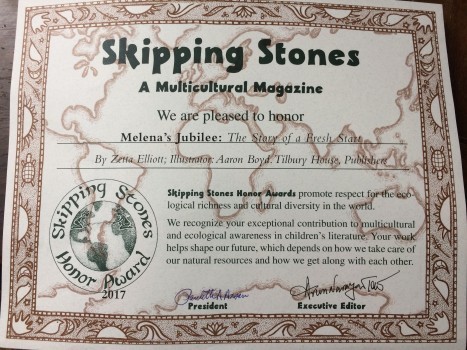 Over the weekend my publisher sent me this lovely certificate from Skipping Stones magazine. For a moment, I thought about making a short video for MELENA’S JUBILEE…then I came to my senses! Mind you, the only way to get better is to keep trying…so stay tuned—another video may appear later this month. I’m late turning in my edits for DRAGONS IN A BAG and my creative writing class starts at the end of the month. On Friday I head to Atlanta for the National Conference of African American Librarians. And then I have to get down to business and start THE DRAGON THIEF. I have one trip planned to Nova Scotia in September, but mostly I’ll be working toward that October 1 deadline. The summer’s disappearing…it’s cool and rainy today. I *say* I’m ready for autumn, but it’s too soon to say goodbye to summer. Better get to work…
Over the weekend my publisher sent me this lovely certificate from Skipping Stones magazine. For a moment, I thought about making a short video for MELENA’S JUBILEE…then I came to my senses! Mind you, the only way to get better is to keep trying…so stay tuned—another video may appear later this month. I’m late turning in my edits for DRAGONS IN A BAG and my creative writing class starts at the end of the month. On Friday I head to Atlanta for the National Conference of African American Librarians. And then I have to get down to business and start THE DRAGON THIEF. I have one trip planned to Nova Scotia in September, but mostly I’ll be working toward that October 1 deadline. The summer’s disappearing…it’s cool and rainy today. I *say* I’m ready for autumn, but it’s too soon to say goodbye to summer. Better get to work…
If you haven’t already downloaded this app, do it now! Kyla Thomas developed We Read Too to help readers find books for kids and teens that are authored by Black writers. It’s free and she’s got all my indie titles, so please check it out!
Making Milo’s Museum
Find out what inspired the author to write a story about an African American girl who builds her own museum.
August 4, 2017
baggage
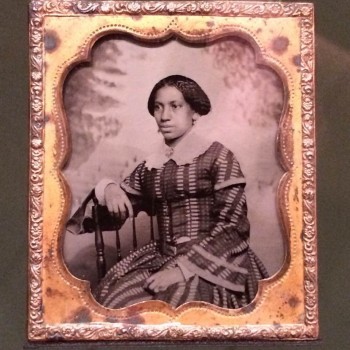 Returning to my “hometown” of Toronto is always fraught—I bring with me a LOT of baggage but by the time I presented on Monday, I was only carrying a small clutch. When I first arrived at York University last Friday, I didn’t recognize the campus (I audited courses there from ’93-’94); there were a lot of new buildings and ongoing construction near the dorm that housed the IRSCL attendees. I had no trouble finding the conference venue and knew what to expect—the first panel consisted of the past five presidents. All were White, of course, including the current president. I looked around the packed auditorium and started counting the people of color in attendance; I saw only one other Black person but then Dr. Michelle Martin stood up to ask an important question: “With controversies at USBBY and ChLA, what was IRSCL doing to promote diversity and inclusion?” I expected the panelists to hedge but I was shocked to hear the current president say they were planning to do further outreach…in Poland. The co-conveners were both White and the conference program revealed that all the keynote speakers appeared to be White as well. By the time that opening
Returning to my “hometown” of Toronto is always fraught—I bring with me a LOT of baggage but by the time I presented on Monday, I was only carrying a small clutch. When I first arrived at York University last Friday, I didn’t recognize the campus (I audited courses there from ’93-’94); there were a lot of new buildings and ongoing construction near the dorm that housed the IRSCL attendees. I had no trouble finding the conference venue and knew what to expect—the first panel consisted of the past five presidents. All were White, of course, including the current president. I looked around the packed auditorium and started counting the people of color in attendance; I saw only one other Black person but then Dr. Michelle Martin stood up to ask an important question: “With controversies at USBBY and ChLA, what was IRSCL doing to promote diversity and inclusion?” I expected the panelists to hedge but I was shocked to hear the current president say they were planning to do further outreach…in Poland. The co-conveners were both White and the conference program revealed that all the keynote speakers appeared to be White as well. By the time that opening 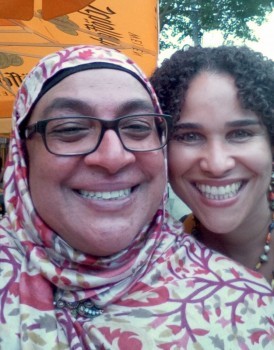 panel ended, I was livid. I considered going back to my room but then met up with Michelle and Rukhsana Khan (left) so we headed over to the reception. Before long, our roundtable moderator Gurbir found us and we wound up seated off to the side, sharing anecdotes about racism in the academy and children’s publishing. By the time we got back from dinner, I was a bit calmer but knew I couldn’t spend the following day attending panels. Instead I took the bus to the train and went to see a fantastic exhibit at the Art Gallery of Ontario: Free Black North. Seeing those images of such poised Black people gave me an idea for my presentation the following day, and it didn’t hurt that I got a warm welcome to the AGO from the Black woman at the admissions desk and the Black man taking tickets at the entrance to the exhibit. After the AGO I walked over to the Royal York Hotel to meet friends for afternoon tea. Another friend in New Orleans told me her son was staying at the same hotel, and I joked that it wouldn’t be hard to spot him since we’d likely be the only two Black people there. But when I arrived, the lobby was FULL of African Americans attending a National Bar Association convention. And
panel ended, I was livid. I considered going back to my room but then met up with Michelle and Rukhsana Khan (left) so we headed over to the reception. Before long, our roundtable moderator Gurbir found us and we wound up seated off to the side, sharing anecdotes about racism in the academy and children’s publishing. By the time we got back from dinner, I was a bit calmer but knew I couldn’t spend the following day attending panels. Instead I took the bus to the train and went to see a fantastic exhibit at the Art Gallery of Ontario: Free Black North. Seeing those images of such poised Black people gave me an idea for my presentation the following day, and it didn’t hurt that I got a warm welcome to the AGO from the Black woman at the admissions desk and the Black man taking tickets at the entrance to the exhibit. After the AGO I walked over to the Royal York Hotel to meet friends for afternoon tea. Another friend in New Orleans told me her son was staying at the same hotel, and I joked that it wouldn’t be hard to spot him since we’d likely be the only two Black people there. But when I arrived, the lobby was FULL of African Americans attending a National Bar Association convention. And 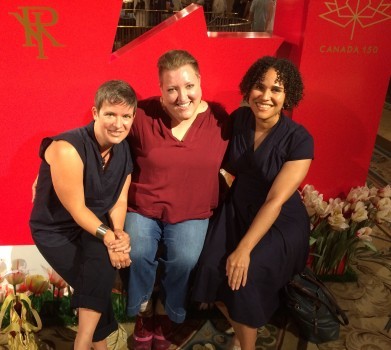 sure enough, I walked by the concierge desk and saw Alfredo! These might sound like small things, but when I consider how lonely, lost, and isolated I often feel in Toronto…those encounters really meant a lot. Tea wasn’t great but hanging out with my friends was fantastic. They walked me to the subway afterward and I took the train to the bus back to York U—that, too, brought back memories. York has been around for at least 50 years but there is NO subway station on campus, which meant it used to take me over two hours to get to class from my home on the east side of the city. Then I’d get to York, take my seat in a classroom full of Black students, but there were no Black professors. I heard from a Black Canadian writer friend while I was in Toronto; we grew up together and it was somewhat reassuring to know that he, too, still thinks about our complicated and often unhappy childhood. During my talk
sure enough, I walked by the concierge desk and saw Alfredo! These might sound like small things, but when I consider how lonely, lost, and isolated I often feel in Toronto…those encounters really meant a lot. Tea wasn’t great but hanging out with my friends was fantastic. They walked me to the subway afterward and I took the train to the bus back to York U—that, too, brought back memories. York has been around for at least 50 years but there is NO subway station on campus, which meant it used to take me over two hours to get to class from my home on the east side of the city. Then I’d get to York, take my seat in a classroom full of Black students, but there were no Black professors. I heard from a Black Canadian writer friend while I was in Toronto; we grew up together and it was somewhat reassuring to know that he, too, still thinks about our complicated and often unhappy childhood. During my talk 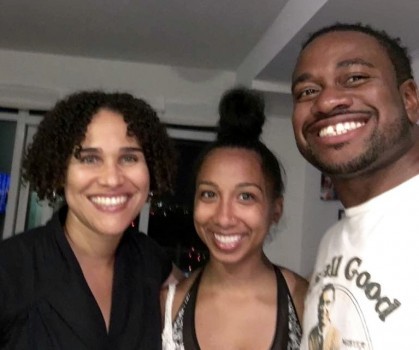 on Monday I talked about not being put in the gifted program when I moved to Scarborough in the 5th grade—common practice according to a recent report. My younger brother lives in Toronto and is currently working with a local school board to bridge the achievement gap with Black and Asian students (boys in particular). It was great to have dinner with Jonathan and his new wife Chantelle on Sunday night, but it’s frustrating to know that decades have passed and yet things really haven’t changed. Another report reveals that most Blacks in the GTA are now born in Canada, not the Caribbean. Yet these “homegrown” African Canadians don’t feel accepted or respected—if they had the option of living in the US, I wonder how many would face the many risks for access to greater opportunities? My Lyft driver was from Pakistan and on the way to LaGuardia he shared that his brother in Montreal had been trying for years to persuade him to move his family up to Canada. But like me, my driver couldn’t imagine giving up the life he’s been able to build in New York. He drives full-time and his wife stays at home to raise their four kids. Even with the current administration, he’s gotten US citizenship and plans to stay put. So do I—for now…
on Monday I talked about not being put in the gifted program when I moved to Scarborough in the 5th grade—common practice according to a recent report. My younger brother lives in Toronto and is currently working with a local school board to bridge the achievement gap with Black and Asian students (boys in particular). It was great to have dinner with Jonathan and his new wife Chantelle on Sunday night, but it’s frustrating to know that decades have passed and yet things really haven’t changed. Another report reveals that most Blacks in the GTA are now born in Canada, not the Caribbean. Yet these “homegrown” African Canadians don’t feel accepted or respected—if they had the option of living in the US, I wonder how many would face the many risks for access to greater opportunities? My Lyft driver was from Pakistan and on the way to LaGuardia he shared that his brother in Montreal had been trying for years to persuade him to move his family up to Canada. But like me, my driver couldn’t imagine giving up the life he’s been able to build in New York. He drives full-time and his wife stays at home to raise their four kids. Even with the current administration, he’s gotten US citizenship and plans to stay put. So do I—for now…

(l-r): Vivek Shraya, Shauntay Grant, Gurbir Singh Junglee, Rukhsana Khan, me
All this is to say that by the time Monday rolled around, I wasn’t wound quite so tight. The oversize suitcase I wheeled into the conference a few days before was now a small clutch purse—I really did try to let a lot of my angst go. And our panel at the Toronto Public Library was fantastic—I don’t think I’ve ever been part of such a dynamic author line-up. Though I’m not sure I came off as an author…I met a college administrator the following day and she said, “You’re Zetta! I’ve seen your face so many times in photos with Ebony Thomas and Sarah Park Dahlen.” And then she asked where I taught because she assumed that I, too, was a professor. I’m not any 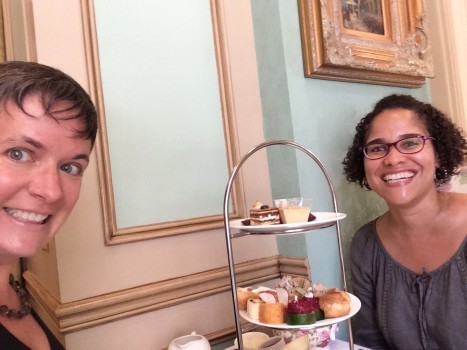 more, which made me wonder for the first time if I seem like an academic groupie! I’d like to believe there’s a place for an author like me in the academy, but experience tells me otherwise. Still, I can’t undo my scholarly training and my book talks are more like mini lectures on racism in publishing. For my IRSCL talk I shared some of the portraits from the Free Black North exhibit and then added portraits of my own ancestors before sharing their multi-generational project to move from Blackness to Whiteness. The curators at the AGO stressed that many Black people fleeing slavery in the US returned after the Civil War due to the severe anti-Black racism they encountered in Canada; they also reminded visitors that the first Underground Railroad led enslaved people OUT of Canada and into the US. I titled my talk, “Don’t Get It Twisted: Loving & Leaving the Great White North,” and admitted that one of my professional goals is to disrupt Canada’s myth of multiculturalism. I didn’t say all that much about my books—there wasn’t time—but I think the York University bookstore still managed to sell just about all of their copies. Rukhsana and I went out to dinner after the panel wrapped up and then I hopped back on the train to get the bus back to York. As we pulled into the campus, a few women introduced themselves as colleagues of Ebony Thomas at Penn. And the next morning before Robin Bernstein gave her keynote address, she acknowledged that the books under consideration were mostly by White authors because people of color are systematically excluded from the publishing industry–she then pointed people to my essays on the subject. I said goodbye to my academic friends at the conference afterward and headed back downtown to have tea—again!—with my friend Dawn. We’ve known each other since we were 8 and that makes her my oldest friend. She told me about the AGO exhibit and went to see it herself after our tea at the Windsor Arms. I don’t know if you’ve already figured this out, but despite the overwhelming Whiteness of the conference, I was happy in Toronto! And that NEVER happens. Another friend of mine has applied for a research position at York University and I really hope she gets it—she’d be an incredible asset to the campus and then I’d have another person to ground me when I venture into the Great White North. Change takes a long time to come to Canada, but it does come eventually…
more, which made me wonder for the first time if I seem like an academic groupie! I’d like to believe there’s a place for an author like me in the academy, but experience tells me otherwise. Still, I can’t undo my scholarly training and my book talks are more like mini lectures on racism in publishing. For my IRSCL talk I shared some of the portraits from the Free Black North exhibit and then added portraits of my own ancestors before sharing their multi-generational project to move from Blackness to Whiteness. The curators at the AGO stressed that many Black people fleeing slavery in the US returned after the Civil War due to the severe anti-Black racism they encountered in Canada; they also reminded visitors that the first Underground Railroad led enslaved people OUT of Canada and into the US. I titled my talk, “Don’t Get It Twisted: Loving & Leaving the Great White North,” and admitted that one of my professional goals is to disrupt Canada’s myth of multiculturalism. I didn’t say all that much about my books—there wasn’t time—but I think the York University bookstore still managed to sell just about all of their copies. Rukhsana and I went out to dinner after the panel wrapped up and then I hopped back on the train to get the bus back to York. As we pulled into the campus, a few women introduced themselves as colleagues of Ebony Thomas at Penn. And the next morning before Robin Bernstein gave her keynote address, she acknowledged that the books under consideration were mostly by White authors because people of color are systematically excluded from the publishing industry–she then pointed people to my essays on the subject. I said goodbye to my academic friends at the conference afterward and headed back downtown to have tea—again!—with my friend Dawn. We’ve known each other since we were 8 and that makes her my oldest friend. She told me about the AGO exhibit and went to see it herself after our tea at the Windsor Arms. I don’t know if you’ve already figured this out, but despite the overwhelming Whiteness of the conference, I was happy in Toronto! And that NEVER happens. Another friend of mine has applied for a research position at York University and I really hope she gets it—she’d be an incredible asset to the campus and then I’d have another person to ground me when I venture into the Great White North. Change takes a long time to come to Canada, but it does come eventually…
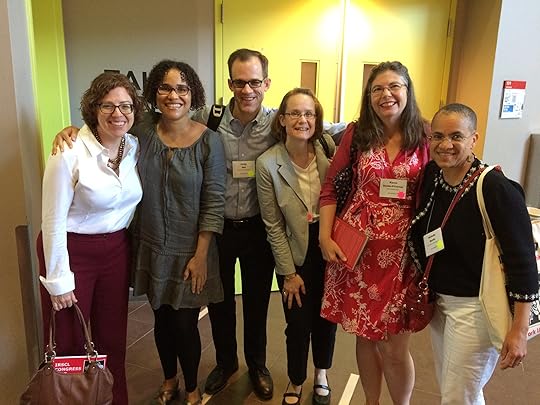
(l-r): Robin Bernstein, me, Phil Nel, Karin Westman, Karen Sands-O’Connor, Michelle Martin



